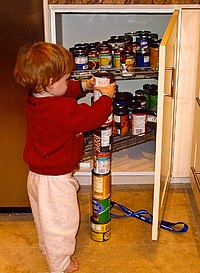
Photo from wikipedia
The human gut microbiome is associated with various diseases, including autism spectrum disorders (ASD). Variations of the taxonomical composition in the gut microbiome of children with ASD have been observed… Click to show full abstract
The human gut microbiome is associated with various diseases, including autism spectrum disorders (ASD). Variations of the taxonomical composition in the gut microbiome of children with ASD have been observed repeatedly. However, features and parameters of the microbiome CRISPR-Cas systems in ASD have not been investigated yet. Here, we demonstrate such an analysis in order to describe the overall changes in the microbiome CRISPR-Cas systems during ASD as well as to reveal their potential to be used in diagnostics and therapy. For the systems identification, we used a combination of the publicly available tools suited for completed genomes with subsequent filtrations. In the considered data, the microbiomes of children with ASD contained fewer arrays per Gb of assembly than the control group, but the arrays included more spacers on average. CRISPR arrays from the microbiomes of children with ASD differed from the control group neither in the fractions of spacers with protospacers from known genomes, nor in the sets of known bacteriophages providing protospacers. Almost all bacterial protospacers of the gut microbiome systems for both children with ASD and the healthy ones were located in prophage islands, leaving no room for the systems to participate in the interspecies competition.
Journal Title: Life
Year Published: 2022
Link to full text (if available)
Share on Social Media: Sign Up to like & get
recommendations!